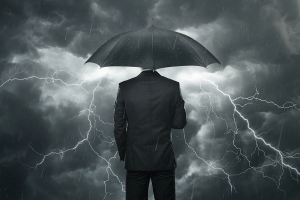Should You Consider Umbrella Insurance?
Umbrella insurance is the ultimate car insurance protection you can have.

Umbrella insurance protects you from the financial storm after a car accident.
Not all drivers are looking for the cheapest policy they can get their hands on that will allow them to drive. Many drivers want the most coverage possible to make sure they are fully protected from even the worst car accident’s aftermath.
For this protection, you need to ask your insurance agent or insurance company about adding umbrella insurance to your existing car insurance policy.
What Is Umbrella Insurance?
Umbrella insurance is usually known as a personal umbrella policy and it does exactly what it sounds like it does. Just like how you use an umbrella above you to protect you from the rain or snow, a personal umbrella policy is placed above your home or auto insurance to protect you from financial ruin.
Umbrella insurance only extends over your liability insurance also, so if your liability coverage isn’t enough to cover the damages or medical expenses of the other person you hit in an accident your umbrella insurance kicks in right where the your liability coverage ends. In other words, umbrella insurance is extra insurance coverage that goes above and beyond what is offered with a regular car insurance policy.
How Exactly Does Umbrella Insurance Work?
Here is an example of how umbrella insurance works:
Say that you cause a car accident that injures another driver. Your regular car insurance has a liability limit of $250,000 to cover medical expenses, but once it hits this limit your insurance company will no longer pay for anything else. So what happens if that limit is not enough to cover the other driver’s needs?
If the other driver’s injuries are bad enough, they may require more than the $250,000 that your policy covers. If that happens, you are responsible for paying the rest of it out of your own pocket and if you can’t they can sue you. If they do, your personal assets would be at stake.
An umbrella policy can cover the additional costs when your insurance isn’t enough. So if you are found to be responsible for $400,000 in medical expenses and other costs and your car insurance only covers $250,000 of that, your umbrella policy will cover the remaining $150,000. For more information contact your car insurance agent or car insurance company on more information on the umbrella policies they offer.

 That dreaded letter has finally arrived in your mailbox, the one advising you that your car insurance rates have just increased. The worse part of it is, is that you don’t remember doing anything since the last renewal to cause your insurance rates to increase.
That dreaded letter has finally arrived in your mailbox, the one advising you that your car insurance rates have just increased. The worse part of it is, is that you don’t remember doing anything since the last renewal to cause your insurance rates to increase.